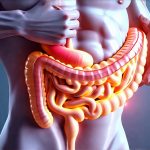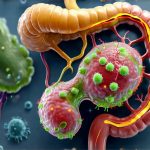The intricate relationship between our gut microbiome, physical exertion, and stress levels is often underestimated. Intense workouts, while beneficial for overall health, can temporarily disrupt the delicate balance within our digestive system. Similarly, periods of high stress – whether emotional, mental, or physical – significantly impact gut flora composition and function. This disruption isn’t merely a matter of discomfort; it has cascading effects on nutrient absorption, immune response, energy levels, and even mood. Rebuilding a healthy gut microbiome after these challenges is crucial for optimizing recovery, bolstering resilience, and maintaining long-term well-being. Understanding the mechanisms at play and implementing targeted strategies are key to restoring digestive harmony.
Our bodies aren’t isolated systems; they’re interconnected ecosystems. When we push ourselves physically, blood flow shifts away from the digestive tract towards muscles requiring oxygen and nutrients. This can slow down digestion, leading to temporary imbalances in gut bacteria. Stress hormones like cortisol further exacerbate this issue, impacting gut motility (movement) and potentially creating an environment that favors less desirable microbial populations. The result is often bloating, gas, changes in bowel habits, or even a weakened immune system. Recognizing these connections empowers us to proactively support our gut health instead of letting it passively suffer the consequences of life’s demands. It’s not about eliminating stress or workouts—it’s about mitigating their impact and rebuilding what’s lost. If you are adjusting to new supplements, consider managing nausea simultaneously.
Dietary Strategies for Gut Restoration
The foundation of any gut-rebuilding strategy lies in dietary choices. What we eat directly fuels (or hinders) the growth of beneficial bacteria. Focusing on a diverse range of whole, unprocessed foods is paramount. This isn’t about restrictive diets; it’s about prioritizing nutrient density and supporting microbial diversity. A diet rich in fiber from sources like fruits, vegetables, legumes, and whole grains provides the ‘food’ that probiotics (beneficial bacteria) thrive on – known as prebiotics. Simultaneously, reducing intake of processed foods, refined sugars, and excessive saturated fats minimizes inflammation and creates a more hospitable environment for positive gut flora.
Beyond simply increasing fiber intake, consider incorporating specific food groups known to support gut health. Fermented foods like yogurt (with live cultures), kefir, sauerkraut, kimchi, and kombucha introduce beneficial bacteria directly into the digestive system. Bone broth, rich in collagen and amino acids, can help repair the gut lining – a critical aspect of restoring function. Polyphenol-rich foods like berries, green tea, and dark chocolate provide antioxidants that support microbial diversity and reduce inflammation. Hydration is also essential; adequate water intake supports optimal digestion and nutrient absorption. Understanding hydration strategies can be especially helpful during recovery.
Finally, timing matters. Post-workout or post-stress, the gut is particularly vulnerable. Prioritize easily digestible nutrients during this period – think simple carbohydrates with a small amount of protein. Avoid large, heavy meals that can further strain the digestive system. Consider sipping on bone broth or consuming a probiotic-rich beverage shortly after exertion or stressful events to provide immediate support. The goal isn’t deprivation but mindful nourishment tailored to your body’s needs during recovery. If recovering from illness you might find simple meals easier to digest.
Probiotic & Prebiotic Synergy
The relationship between probiotics and prebiotics is symbiotic – they work best together. Probiotics are the live microorganisms that colonize the gut, while prebiotics are the non-digestible fibers that feed those microorganisms. Simply taking a probiotic without adequate prebiotic support can be less effective, as the bacteria lack the fuel to thrive. Conversely, consuming prebiotics alone won’t necessarily establish a robust microbial population if there aren’t enough beneficial bacteria present.
- To maximize benefits:
- Choose a high-quality probiotic supplement containing diverse strains of Lactobacillus and Bifidobacterium. Look for supplements with CFU counts in the billions (though quantity isn’t always the most important factor – strain diversity is key).
- Incorporate prebiotic-rich foods into your diet daily, such as onions, garlic, leeks, asparagus, bananas, oats, and apples.
- Consider a synbiotic supplement – a combination of probiotics and prebiotics in one product.
It’s important to note that probiotic supplementation isn’t a one-size-fits-all solution. Individual gut microbiome composition varies significantly. What works for one person may not work for another. Starting with a low dose and gradually increasing it can help minimize potential digestive upset. Listen to your body and adjust accordingly. For those with digestive motility disorders, probiotic support is vital.
Mindful Eating & Digestion Support
Beyond food choices, how we eat plays a significant role in gut health. Rushing through meals, eating on the go, or being distracted while eating can all impair digestion. Stress inhibits proper enzyme production and reduces blood flow to the digestive system, leading to incomplete breakdown of food. Mindful eating – focusing fully on the experience of eating, savoring each bite, and chewing thoroughly – optimizes digestion and nutrient absorption.
- Practice these techniques:
- Sit down to eat in a calm environment free from distractions.
- Chew your food completely before swallowing. This initiates the digestive process and reduces the burden on the stomach.
- Eat slowly and savor each bite. Pay attention to the flavors, textures, and aromas of your food.
Additionally, consider incorporating digestion-supporting practices into your routine. Ginger tea can help soothe the digestive tract and reduce nausea. Peppermint oil capsules have been shown to alleviate symptoms of irritable bowel syndrome (IBS). Digestive enzymes supplements can be helpful for individuals with compromised digestion or difficulty breaking down certain foods – but should be used under professional guidance. It’s also beneficial to understand best practices when experiencing a flare up.
Stress Management & Gut Connection
The gut-brain axis is a bidirectional communication pathway between the digestive system and the brain. Chronic stress profoundly impacts this axis, leading to imbalances in gut flora and increased intestinal permeability (often referred to as “leaky gut”). Managing stress levels is therefore integral to rebuilding gut health. Techniques like meditation, yoga, deep breathing exercises, spending time in nature, and engaging in enjoyable hobbies can all help reduce cortisol levels and promote a more balanced nervous system.
- Implement these strategies:
- Prioritize regular exercise (but avoid overtraining). Physical activity releases endorphins, which have mood-boosting effects.
- Practice mindfulness or meditation daily to cultivate calm and reduce stress reactivity.
- Ensure adequate sleep – aim for 7-9 hours of quality sleep each night. Sleep deprivation exacerbates stress hormones.
The key takeaway is that gut health isn’t solely about diet; it’s intrinsically linked to our mental and emotional well-being. Addressing the root causes of stress and incorporating stress management techniques are essential components of a comprehensive gut restoration strategy. A holistic approach—combining dietary changes, probiotic/prebiotic support, mindful eating practices, and effective stress management—offers the most sustainable path to digestive harmony and overall health. Remember that having pantry staples on hand can ease recovery during challenging times, and a low fat diet may be beneficial after digestive disturbance.


















